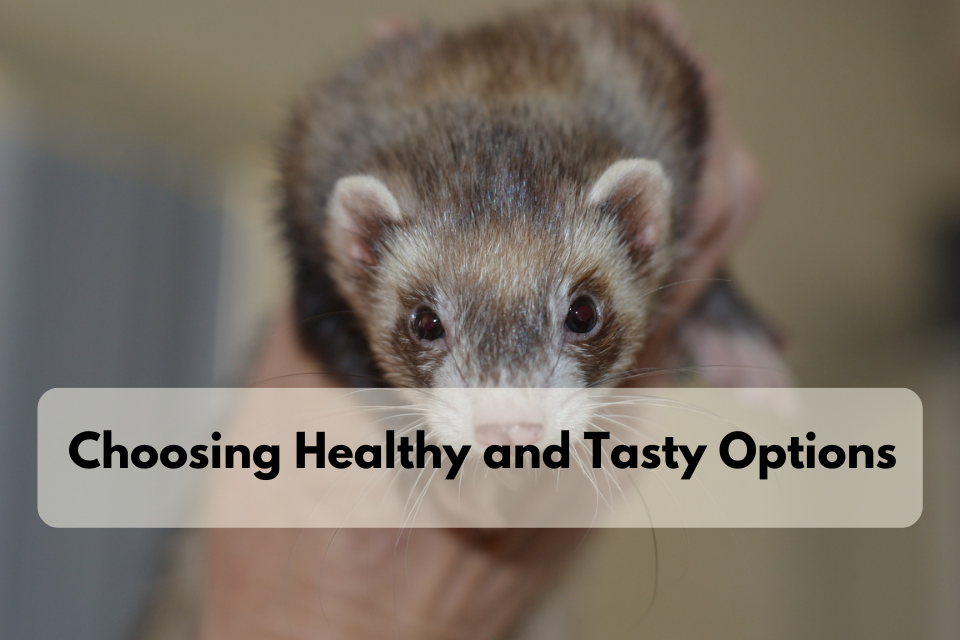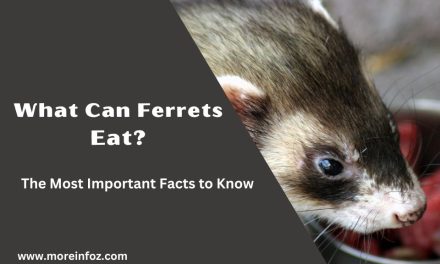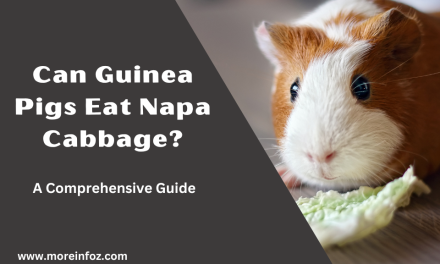Ferrets are delightful and playful pets that bring joy and companionship to our lives These energetic little creatures have specific dietary needs, and providing them with suitable treats is a great way to strengthen the bond between you and your ferret. In this comprehensive guide, we’ll explore the world of treats for ferrets, discussing the importance of healthy options and suggesting some tasty choices that will leave your fuzzy friend begging for more.

1. Understanding the Importance of Ferret Treats
Ferrets have unique nutritional requirements, and treats play a crucial role in their overall well-being. Treats should not only be enticing and enjoyable but also provide essential nutrients that support their growth, energy levels, and overall health. When selecting treats, it’s essential to consider their nutritional value and ensure they complement the ferret’s regular diet.
2. Healthy Treat Options for Ferrets
a. High-Quality Meat Treats: Ferrets are obligate carnivores, meaning they thrive on a meat-based diet. Look for treats made from high-quality sources of animal protein, such as chicken, turkey, or lamb. Avoid treats containing fillers, artificial additives, or excessive amounts of salt or sugar.
b. Freeze-Dried Treats: Freeze-dried treats offer a convenient and nutritious option. These treats preserve the natural flavors and nutrients of the ingredients without the need for artificial preservatives. Freeze-dried meats like chicken or beef liver can be a hit with ferrets.
c. Ferret-Specific Treats: Some pet food brands produce treats specifically formulated for ferrets. These treats often contain a balanced blend of proteins, fats, and other essential nutrients that cater to a ferret’s unique dietary requirements.
d. Homemade Treats: You can also create homemade treats for your ferret, using recipes that include ferret-friendly ingredients like eggs, meat, and certain fruits or vegetables. Ensure the ingredients are safe for ferrets and avoid any potential harmful foods like chocolate or onions.
3. Treats to Avoid
Certain treats can be harmful or unsuitable for ferrets. Avoid sugary snacks, chocolate, processed human foods, and anything containing ingredients that are toxic to ferrets, such as caffeine or xylitol. Also, be cautious with treats that contain excessive amounts of grains or carbohydrates, as ferrets have difficulty digesting them.
4. Moderation and Portion Control
While treats are a great way to reward and interact with your ferret, it’s important to exercise moderation and portion control. Overindulgence can lead to obesity and health issues. Treats should only comprise a small portion of their overall diet and should not exceed 10% of their daily caloric intake.
Conclusion
Choosing the right treats for your ferret is crucial for their health, happiness, and overall well-being. Opt for high-quality, nutritious options that align with their carnivorous nature and avoid any harmful ingredients. Remember to offer treats in moderation and monitor your ferret’s weight and overall health. By providing your furry friend with the best treats for ferrets, you’ll be rewarded with a happy, energetic companion who knows just how loved they are.
- Q: What kind of treats are suitable for ferrets? A: Ferrets thrive on a meat-based diet, so treats made from high-quality animal protein, such as chicken or turkey, are ideal.
- Q: Can I give my ferret treats designed for other small animals? A: It’s best to avoid treats designed for other small animals, as they may not meet the specific nutritional needs of ferrets.
- Q: How often can I give treats to my ferret? A: Treats should only make up a small portion of your ferret’s diet, so it’s recommended to offer treats in moderation, around 2-3 times per week.
- Q: Are there any treats that can be harmful to ferrets? A: Yes, certain treats can be harmful to ferrets. Avoid sugary snacks, chocolate, processed human foods, and ingredients that are toxic to ferrets, such as caffeine or xylitol.
- Q: Can I give my ferret fruits and vegetables as treats? A: While ferrets can enjoy small amounts of certain fruits and vegetables as treats, they should be given sparingly due to their high sugar and fiber content.
- Q: Are there any homemade treat recipes for ferrets? A: Yes, you can find homemade treat recipes online that use ferret-friendly ingredients like eggs, meat, and certain fruits or vegetables.
- Q: How should I introduce new treats to my ferret? A: When introducing new treats, start with small quantities and observe your ferret’s reaction. If they enjoy it and show no adverse effects, you can gradually increase the serving size.
- Q: Can treats be used as training rewards for ferrets? A: Absolutely! Treats can be a useful tool for positive reinforcement training with ferrets. Just ensure that the treats are small and easily chewable.
- Q: Can treats help with bonding and interaction with my ferret? A: Yes, treats can strengthen the bond between you and your ferret. Offering treats during playtime or training sessions can enhance the positive association between you and your furry friend.
- Q: What are some commercially available ferret treats? A: There are several pet food brands that produce ferret-specific treats, which are formulated to meet the nutritional needs of ferrets. Look for reputable brands at pet stores or online.
- Q: Can I give my ferret raw meat as a treat? A: It is generally not recommended to feed raw meat to ferrets due to the risk of bacterial contamination. Stick to cooked or commercially prepared meat treats instead.
- Q: How can I ensure that the treats I choose are healthy for my ferret? A: Read the ingredient list carefully and avoid treats with excessive salt, sugar, fillers, or artificial additives. Look for treats made from high-quality, natural ingredients.
- Q: Should I be concerned about my ferret becoming overweight from treats? A: Yes, overindulgence in treats can lead to weight gain and health issues in ferrets. Ensure that treats make up no more than 10% of their daily caloric intake.
- Q: Can ferrets have treats with grains or carbohydrates? A: Ferrets have difficulty digesting grains and carbohydrates, so it’s best to avoid treats that contain excessive amounts of these ingredients.
- Q: Are there any specific treats recommended for dental health in ferrets? A: Some treats are designed to promote dental health in ferrets by encouraging chewing and reducing tartar buildup. Look for dental treats formulated for ferrets





